Can I Repost the Same Thing Again on My Blog

1 of the near common questions I get from people, including clients and prospective clients, is whether or non it's okay to copy content from elsewhere and mail service it equally a blog commodity on their site.
The brusk answer to this is "no," but there's some nuance to it that I want to explain in greater item. So, I'one thousand writing a post well-nigh information technology that I can point to as a resource later.
Allow'due south dig in!
Why You Might Want to Copy Content
I've seen many bloggers inquire near copying content to their site, and there are many unlike reasons they give to do information technology.
The biggest one is ordinarily time and try investment. If you spent fourth dimension creating a slice of content, why not utilise it anywhere you can? Alternatively, you're making a microsite and want to load information technology upward with blog content but don't desire to take the time to make all of that content.
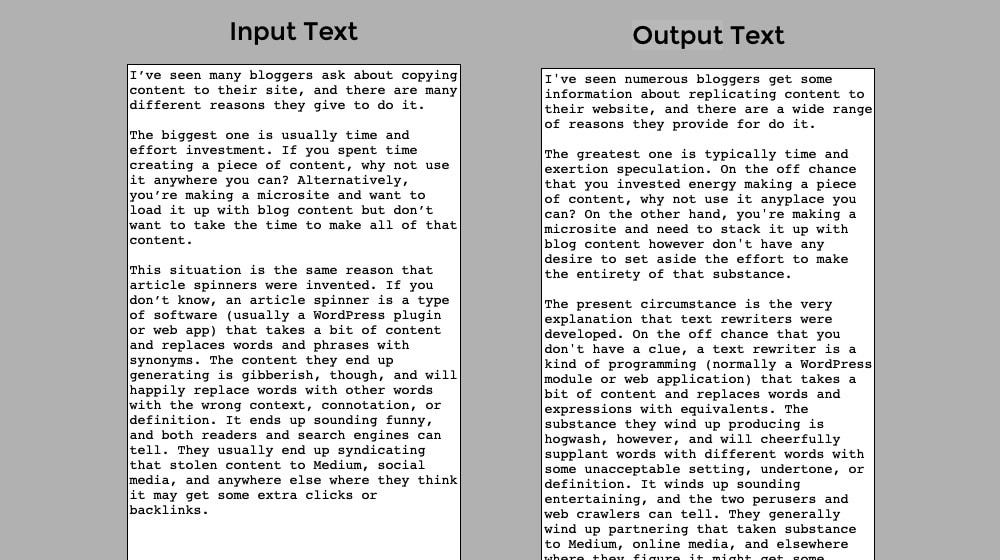
This state of affairs is the same reason that commodity spinners were invented. If you don't know, an article spinner is a type of software (usually a WordPress plugin or web app) that takes a scrap of content and replaces words and phrases with synonyms. The content they end up generating is gibberish, though, and will happily supervene upon words with other words with the incorrect context, connotation, or definition.
Information technology ends up sounding funny, and both readers and search engines tin tell. They usually end up syndicating that stolen content to Medium, social media, and anywhere else where they think information technology may get some actress clicks or backlinks.
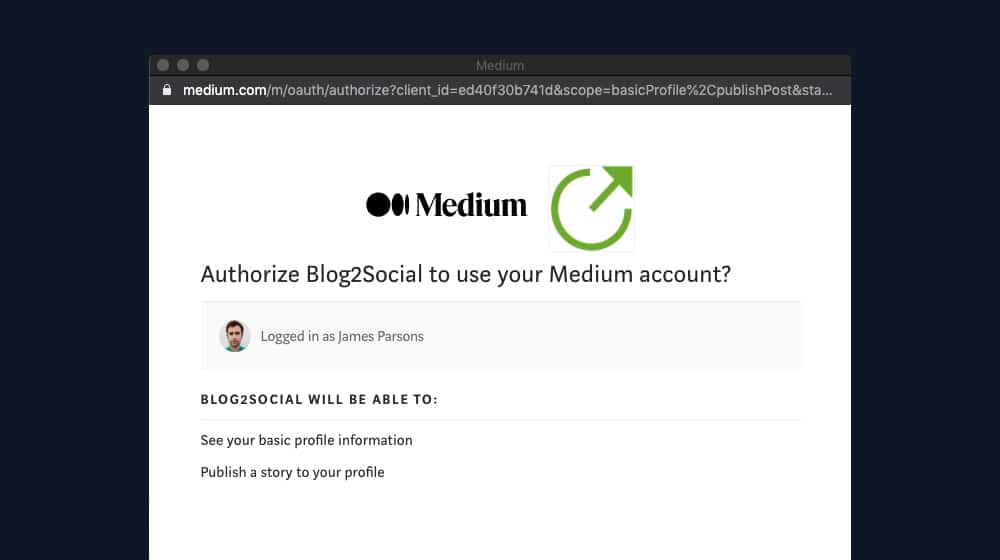
Another reason is the desire to showcase the work of others while giving them attribution. This can fill up gaps in your editorial agenda apace and easily. There'due south a specific word for this, and I'll get to it later.
Regardless ofwhya blogger would want to copy content from another source onto your blog, it'due south non a smashing thought, and information technology's one of the traps people who are unfamiliar with SEO fall into. Information technology seems like a good plan if you lot don't know any improve.
Three Methods of Copying Content
At present let'southward expect at the three scenarios I meet most frequently for copying content.
ane. Y'all take content on i site you ain and want to re-create information technology to another site you own.
This concept is a fairly reasonable i at starting time. Later on all, you created a piece of content; why shouldn't yous utilize it as y'all delight? You're the owner of the content, and you fabricated information technology, so you have the rights to it, and you can post it anywhere you want.
The trouble hither is non legal; information technology'south SEO. When the same commodity appears on 2 different domains, it can only give value to one of them, and the other is either stealing the content or syndicating it.
Google wants to requite credit to the source of the commodity. Otherwise, what would stop a large site from merely copying the content from whatever small site they come across? The minor site wouldn't have the power to fight dorsum.
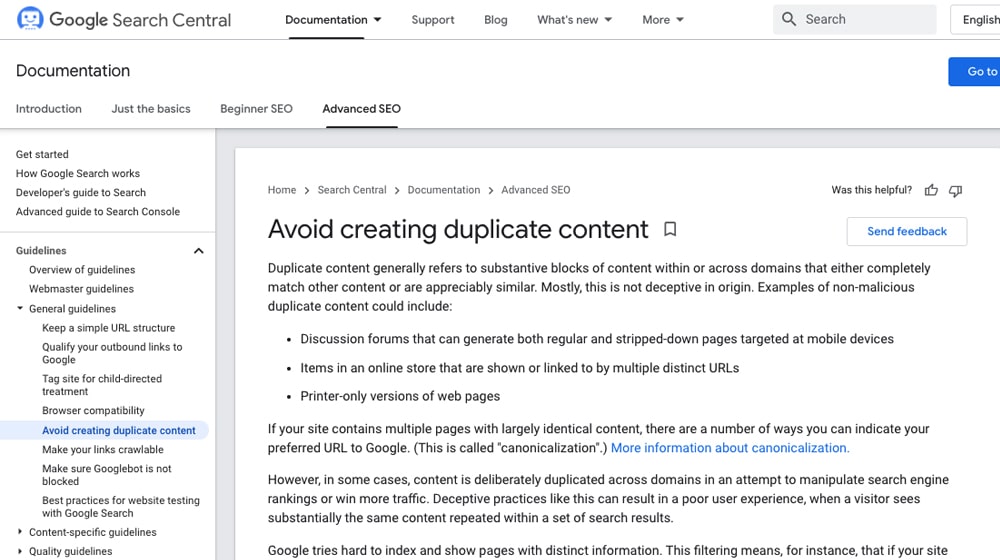
Generally, the webpage published outset (and later on had Google index that article) is the original source. Withal, there are many different factors at play here. If somebody steals your content and backdates it to an earlier appointment in an endeavour to fool Google, information technology may not piece of work if that website has a history of stealing content. Website reputation also matters, and websites that steal content tend to have a pretty bad reputation.
So, this means that even though you own the content and take the right to do with it what you lot will, you can't become indistinguishable value out of it. I'll dig more into the issues with duplicate content later on, though.
For now, suffice it to say that there's no existent shortcut to growing two sites. You tin't simply copy a site and expect the copy to work just equally well. At best, they might divide the original value, simply more frequently, the duplicated weblog post never gains traction.
2. You want to copy content from a site you lot don't ain, with attribution for the original creator.
When you don't own a piece of content but you desire to use it on your site, insome cases,you can do so with attribution. There are two instances where this is allowable.
The get-go is content syndication (not to be confused with content curation). From HubSpot:
"Content Syndication ways republishing the same piece of content -- an commodity, a video, an infographic, etc. -- on one or more unlike websites. Publications, big and small, like to syndicate content because it helps them give fresh information to their readers. The original authors also benefit from this practice since information technology gets their make in front of a new audition. Information technology's a win-win."
Yous encounter this all the fourth dimension with news websites. Every local NBC affiliated site volition postal service the same story across them, with the same writer, the verbal copy, the same everything. Y'all'll also see it on some news sites, like Yahoo News, which will mail service content from news affiliates. This post on Yahoo News has a line at the bottom that says "read the original commodity on Business organization Insider," forth with a Business Insider flag at the top. Yahoo News didn't create that content; Business organisation Insider did, assuasive Yahoo to syndicate information technology.
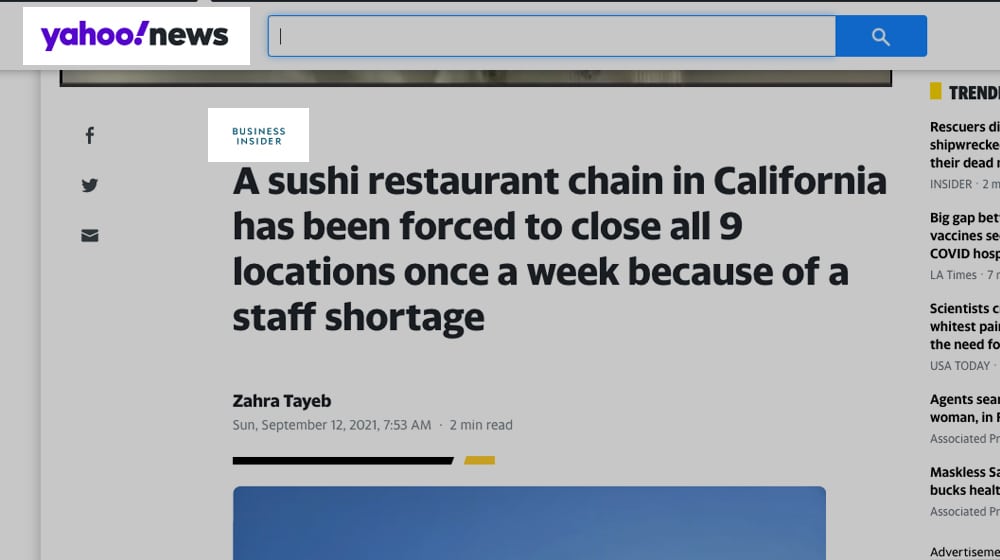
The cardinal here is the give-and-takeaffiliated.To syndicate content, you lot demand a syndication deal with the person initially publishing the content. Yahoo deals with other major news publications, such as Business organization Insider, Reuters, HuffPost, and hundreds of smaller news sites. Yahoo originally wrote very little of what was published on Yahoo.
You can't syndicate content without a syndication agreement. If you accept content from a site you didn't produce and don't own, even if you link to the original mail service and aspect it to their website, it's withal content theft.
You tin utilize the 2nd option when an article is licensed nether a specific Creative Eatables license. The Creative Commons license set is a group of licenses y'all can use to, essentially, waive your correct to copyright on a piece of content. You can say, "y'all can use this and so long as y'all credit me," or "you lot can apply and make changes to this as long every bit it's non-commercial," and then on. At that place are a diversity of Creative Commons licenses y'all can meet at the link to a higher place.
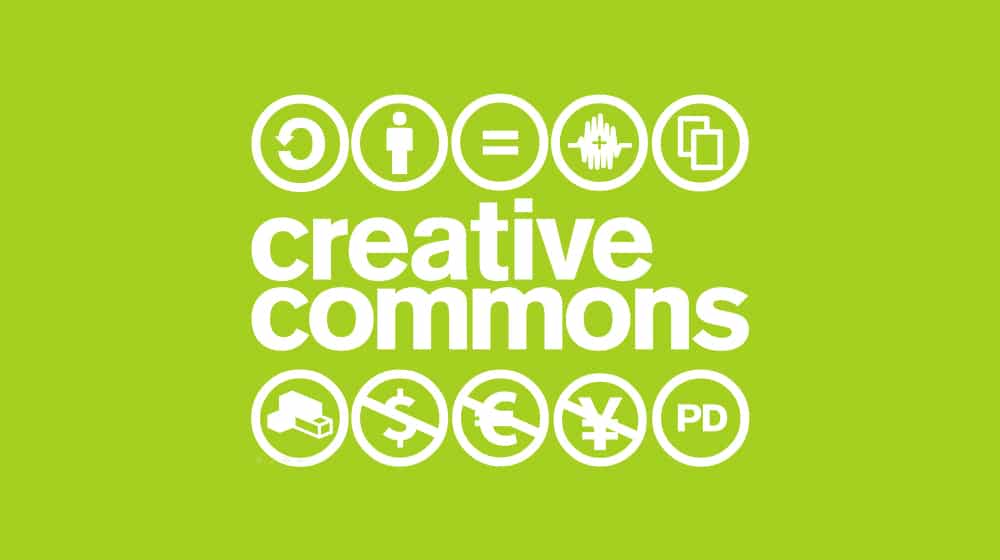
Now, most content licensed under Creative Commons tends to be art, not writing. Information technology'due south visual, graphical, or audio. These tend to be elements people tin can use in their productions, like a stock photo you lot utilise as a background to your header image or a stock song y'all use as background music in a YouTube video.
Sometimes, written works are licensed under a Artistic Commons license, but that content is rarelyworthcopying wholesale. You can, simply it won't do you a lot of good.
Is your weblog earning you business? If not, allow'due south fix that.
We create blog content that converts - not just for ourselves, simply for our clients, too.
We pick weblog topics similar hedge funds choice stocks. And then, we create articles that are 10x amend to earn the superlative spot.
Content marketing has ii ingredients - content and marketing. Nosotros've earned our black belts in both.
If y'all run an internet-based business and are looking to calibration, schedule a telephone call to speak with our founder:
At that place'due south also elementary copyright expiration. Once a piece of written content has been around long enough, it enters the public domain, where anyone can employ information technology. A lot of old fairy tales and stories, besides as a ton of older literature, fall under this category. Disney has fought this for years, which is why the electric current duration of copyright is "the life of the writer plus 70 years." So, if the author of the content you lot desire to copy died 70 years agone, y'all can use it on your site. But, again, that's not likely to have whatsoever value to yous as a modernistic-mean solar day business concern blog.
three. You want to re-create content from a site you don't own, with no attribution.
Why not simply take content? If someone posts information technology on the internet for anyone to run across, that ways it'due south gratuitous to use, right?
Unfortunately, this is a pervasive mental attitude, especially amongst older people. It leads to a ton of content rights violations everywhere, from YouTube to blogs to graphic designs. Every fourth dimension a business performs a Google image search for a picture and uses it in their branding, they're doing this.
Those of you in the know are already screaming about this, and with skilful reason.This isn't just content theft;it's a copyright law violation, and information technology has a lot of penalties attached to it.
- If Google discovers information technology – and they will – they tin penalize or completely deindex your site.
- If the original blogger discovers it, they can result a DMCA takedown for the content and have it pulled past your web host.
- If yous persist in using it, the copyright holder can sue you lot for a copyright infringement. Penalties for this can range from $200 to $150,000per violation, plus legal fees, and in extreme cases tin fifty-fifty include jail time.
Yes, that's right; in an extreme circumstance of content theft, you could be looking at harsh financial penalties and jail fourth dimension - all because yous wanted to fill out a content calendar the like shooting fish in a barrel way!
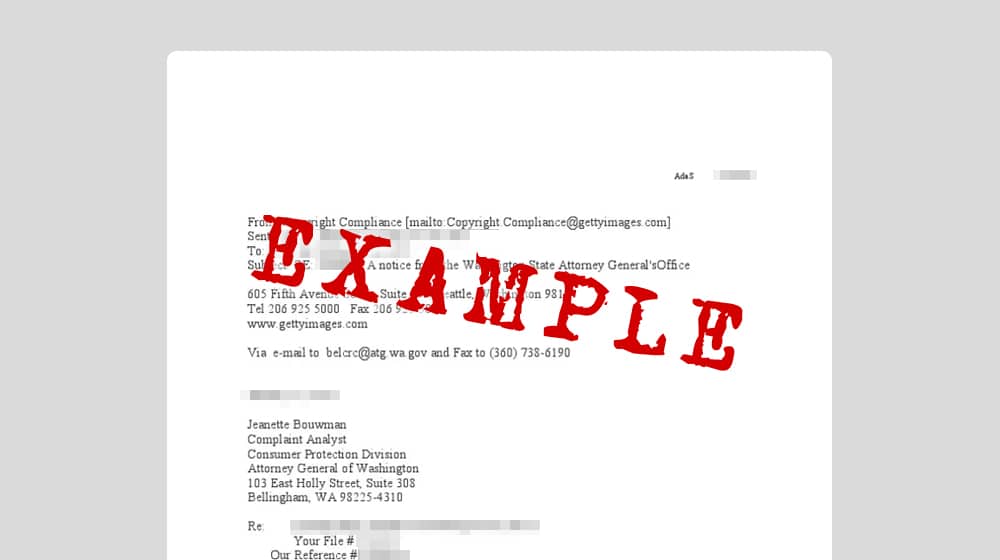
Now, I'll give credit where it's due; most of my clients and prospective clients who have asked near copying content know meliorate than committing copyright violations. They want to repurpose their own content or syndicated content but don't know the correct mode to go most it. I still have to include this because it comes up now and then, and I cannot stress this indicate enough: practice non steal content.
The Problem with Duplicate Content
There are a few bug with duplicate content, even if you utilize it legitimately.
If you're duplicating content without the right attributes and credit, Google will consider it content theft. They now take duplicate content seriously since the bad old days of the net where copied content was rampant, and there was no enforcement to be found. At that place was a time, years agone – and perchance some of yous remember this – where the top 10, xx, or more Google search results were all identical articles published on dissimilar domains. This strategy doesn't piece of work anymore, equally information technology gives Google'due south users a poor feel. Part of what makes Google nifty is reading unique content, not reading dozens of the same articles.
Duplicate content isn't a skillful thing from a user perspective. If you desire data well-nigh a subject and there are "ten" results, but all ten of them are identical, yous're only getting one result. If you want something else, you either need to dig deep to find it, or y'all're out of luck.

Many SEO experts call duplicate content a "myth," but the truth is, there are many dissimilar types of plagiarized content. If you re-publish a news article on your site relevant to your audience, information technology's not going to become your website delisted from Google. However, if y'all copy dozens of manufactures from one of your websites to a brand new website, you shouldn't wait that content to get visitors from search engines, even if it won't penalize your site. So, information technology might exist a myth that you volition go a manual action penalty, but that doesn't mean it's a good idea in the slightest.
Duplicate content is notwithstanding very much something that yous should avert.
Google didn't like indistinguishable content considering users didn't like it, so they started finding the source of content and promoting that one, while all the rest were either demoted or removed. They still allow for syndication and non-malicious duplication, using canonicalization, but in that location's a catch.
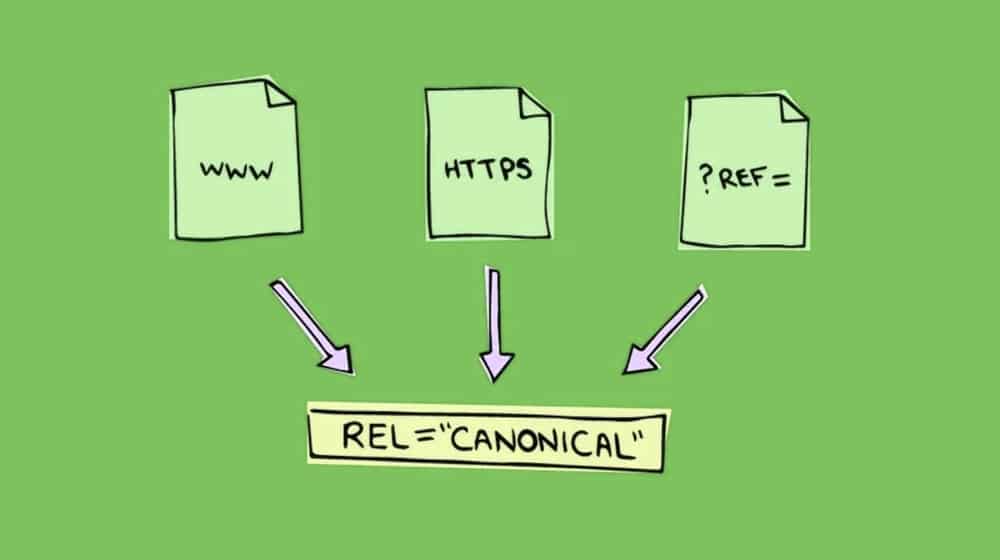
If you post content to your site that came from somewhere else and set your rel="canonical" tags to the source, that source gets the value from that content. You won't get organic traffic, but at least you won't be penalized for it, either.
Check and Prevent Indistinguishable Content
The best way to check for duplicate content is with a plagiarism checker such every bit Copyscape. The "Costless" version does a great job for content that is already published, and the "Premium" version can search snippets of text and perform batch searches.
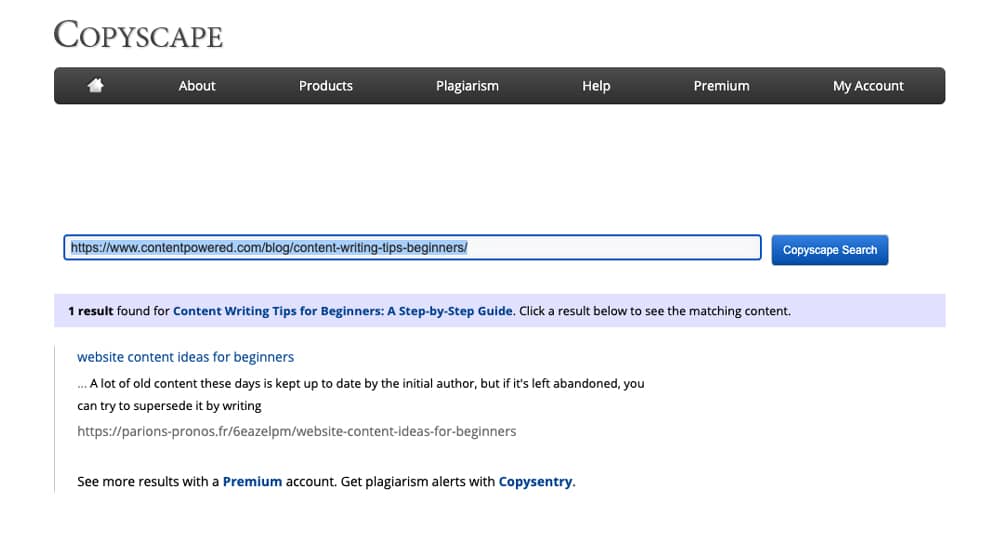
They also have a product called Copy Sentry, which can scan your blog posts for you lot on a schedule and let you know if whatever of them are stolen.
A striking on Copyscape doesn't necessarily mean that it'south stolen; it'southward a very sensitive piece of software that can choice up a single copied sentence. Small amounts of text similar this aren't something to worry about. If the unabridged article exists on another website, though, you may want to reconsider reusing it.
There are many ways to prevent and discourage content theft, such equally disabling your RSS feed or showing summaries instead of entire weblog posts.
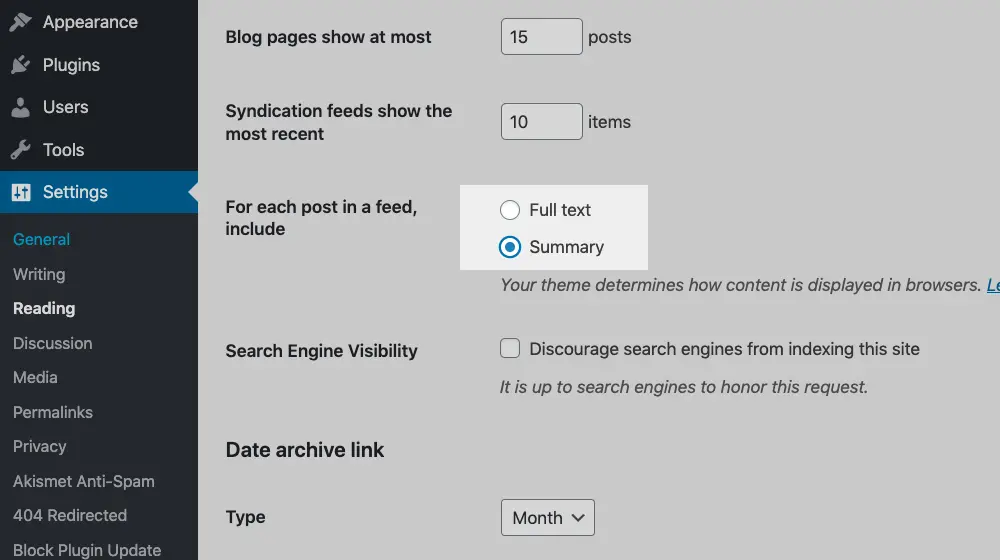
I wrote a separate mail on that bailiwick hither:
The Quest for Unique Value
The key to getting a website to rank is developing a robust and unique content strategy. Content should showcase your brand authorisation, idea leadership, and knowledge of your field of study. Information technology's meant to convince readers that yous know what yous're talking most and then that they trust y'all as a brand, so they will be more than probable to catechumen into customers.
If the content you're posting comes from some other content creator, is it doing that for you? Probably non.
- The content might be referential to areas of expertise y'all don't accept.
- The content might be focused on an attribute of your industry you don't cover.
- The content comes from an authority that isn't you lot; why would you proceeds authority from knowing who else in the manufacture has say-so?
You don't get much if any SEO value out of syndicating web log content. People who use syndication equally an SEO technique exercise so to build links, unlinked mentions, and traffic. If yous're the ane publishing the syndicated content, you're not getting those; you're giving them.
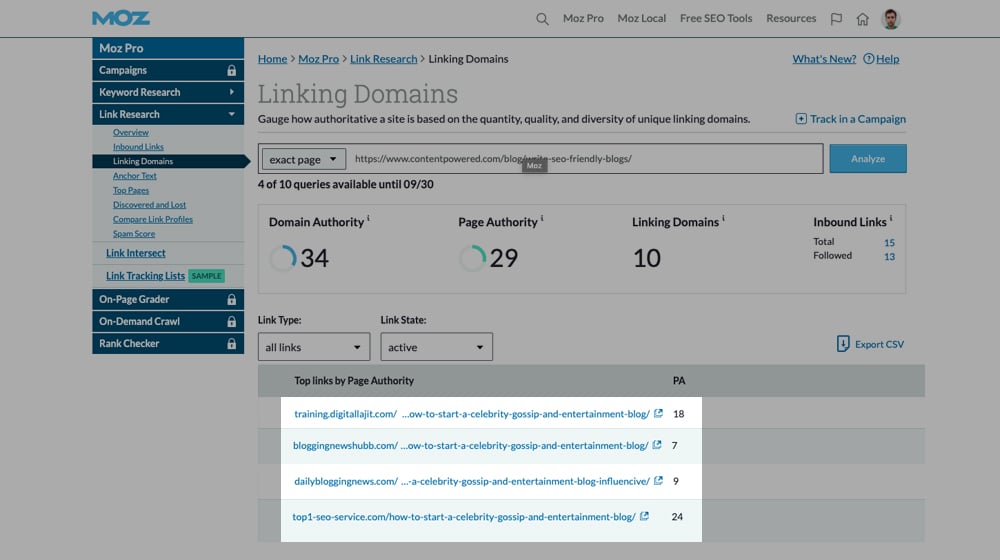
What about if you lot're the ane that produced the content in the first place? Well, if yous're copying it betwixt two of your sites, Google will most probable credit the value to the original blogger, not the re-create. The re-create won't do much for the secondary site. Users also might non trust the second site if they recognize the content from the starting time website. Even if they're both written by the same person, they may wonder if it'south plagiarism and if they can trust the second site.
In extreme cases, the ii sites might even exist considered office of a private web log network or another form of link scam. These are meant to promote i website using a network of other sites that exist solely to give it a small amount of SEO value. At the same time, none of it is genuinely organic. These can ofttimes be deindexed, and recovery from this penalization can be difficult or impossible.
The Moral of the Story
The full breakdown is simple. For your website to succeed, you need as much unique and high-quality content as possible. There are no shortcuts to this. Someone, somewhere, needs to put the time, money, or difficult work into creating original content if you want your site to succeed. You can exercise that yourself, or you lot can pay a content marketing company like mine to practise it for you.
As long as the content on your site is original, yous'll be off to a good start.
Source: https://www.contentpowered.com/blog/safe-copy-repost-article/
0 Response to "Can I Repost the Same Thing Again on My Blog"
Enregistrer un commentaire